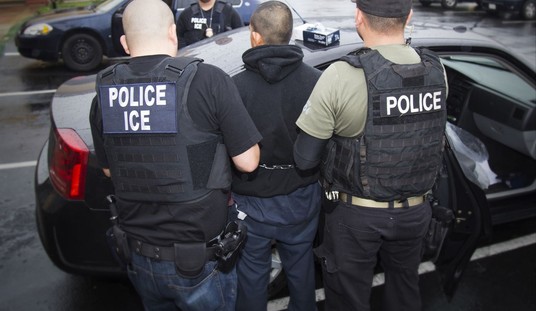Every American is descended from someone who came here from somewhere else. Every one.
The left is fond of saying "we're a nation of immigrants," and while this is strictly speaking true - every human being on the North American continent can trace their ancestry back to someone who came here from somewhere else, one way or another - the left is also fond of deliberately conflating legal and illegal immigration. My first ancestor I know of to come to the New World was one Donald MacKay, who came from northwestern Scotland and sold himself into indenture in 1690, to pay for his crossing. The most recent was Johann Reisse, who brought his wife and 10 (!) children from a farm north of Mannheim, Germany, to the United States in 1850.
Even American natives descended from people who came from Asia, crossing into the New World when Beringia was dry land. But that was then, and this is now. So, with so much of our national attention, not to mention the news cycle, focusing on illegal immigration, it's important to take a moment to think about the issue of legal immigration. Is this a system we could improve? I think it is. Here's why.
I’m not against immigration per se. I am against illegal immigration. I’m also against unchecked immigration; the day when the United States can absorb an unlimited number of immigrants is over. We should now be selective in admitting only people who can contribute to our economy; we can either have a welfare state or open borders, but we most assuredly cannot have both. While I do believe that people have a right to travel, in this case property rights take precedence, and to the people of a nation, the nation is their property; a nation is a defined structure, an association of people (a voluntary association, I might add – if you don’t like it in the U.S., you are certain free to leave) and not only do we have the right to protect our property, our nation, against invasion, we also have the right of disassociation – the right to choose who we allow to join our group.
So, how do we choose? A recent piece at The Federalist, by John Daniel Davidson, raises a couple of interesting points.
Yes, we have to secure our border and put a stop to illegal immigration. But that’s just part — and arguably a small part — of a much larger and more difficult problem, which concerns American identity, national sovereignty, and cultural cohesion.
I wrote last week that in America today not everyone with citizenship is actually an American. To some, this might sound incendiary or extreme. Certainly it violates the tenets of multiculturalism that have been ascendant in America for decades now. But it’s actually just a straightforward observation of reality — so long as we understand that being an American means something more than merely securing legal documents or going through a neutral administrative process. Doing so might confer citizenship, but it will not make someone an American.
There's a good argument to be made for this to be the first screening step: Does a legal immigration applicant want to become an American?
This isn't necessarily as tied to land of origin, ethnicity, and so on, as we may think. During CPAC 2024, when I was using Uber to shuttle back and forth between the hotel and the venue, I had reason to speak to several Uber drivers who were recent immigrants. One of them had immigrated from the African nation of Chad, and told me with obvious pride about recently passing his citizenship test. He was working a job during the day and driving for Uber in the evenings, to save money for a home for his family. "I want to buy a house," he told me. "In one year, I will have my down payment. In Chad, I never would have dreamed of buying a house. In America, I can." This was a man proud to be a new American, a hard-working man providing for his family, a man whose love for his new home was apparent. The driver from Uganda said, "America is like no place else. In my country, you can never have success. In America, if you work, you succeed." And a middle-aged woman from Ethiopia said, proudly, "I learned English," she told me in accented but perfect English. "I came to America because I want to be an American. I now dress like an American and work like an American."
These are the people we should be attracting.
Also, there's nothing wrong with screening applicants for immigration for marketable skills - people who will come and immediately begin to contribute to the economy. We should make these determinations first and foremost on what is good for the United States.
As for the people who want to get on some American gravy train, that's easy enough to address: No non-emergency care or government benefits for immigrants for a set period of time, say, five years. If you come here, you have to work. If you don't work, you go back.
See Also: Trump Drops the Hammer in New Statement on People Who Are Physically Attacking ICE Agents
Another thing that needs a good, hard look is our refugee system. We have taken in thousands, tens of thousands, hundreds of thousands of economic and social refugees from all over the world: Haiti, Syria, Iraq, many other places. This is normally done under the Temporary Protected Status visa program, the keyword being "temporary." All too often, these people establish themselves and, regardless of conditions in their country of origin, never leave. People under this status who have made no effort to normalize their presence in the United States, no effort to establish permanent residency, and no effort to become a citizen, should be returned to their country of origin the moment conditions permit. That's what "temporary" means. Instead, they are becoming a burden on the systems of small cities and towns across the United States.
The United States is, yes, a country of people descended from immigrants. Yes, we are still big enough, prosperous enough, to welcome in people who want to become American, to take advantage of the boundless opportunities of their new home, and people will be proud of their new country. But there have to be limits. We shouldn't be expected to take in people who won't contribute, who won't become American, who will self-segregate, who will cause trouble.
This may not be the huge, festering problem that illegal immigration is today. But it's something that could use some work.















